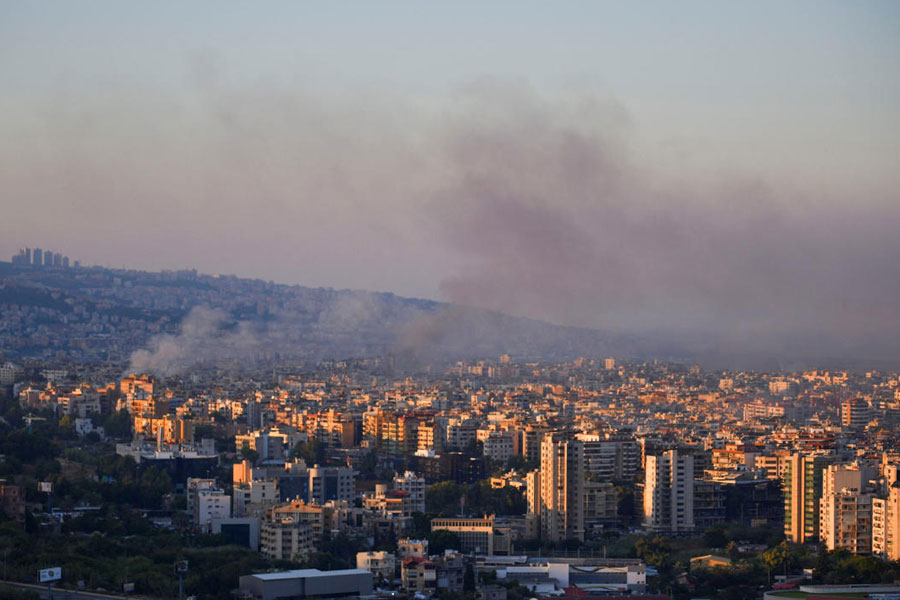An Israeli strike on Friday morning near Lebanon's Masnaa border crossing with Syria cut off a road used by hundreds of thousands of people to flee Israeli bombardments in recent days, Lebanon Transport Minister Ali Hamieh told Reuters.
Hamieh said the strike hit inside Lebanese territory near the border crossing, creating a four-metre (12 feet) wide crater.
An Israel Defence Forces (IDF) military spokesman had accused Iran-backed Lebanese armed group Hezbollah on Thursday of using the crossing to transport military equipment into Lebanon. "The IDF will not allow the smuggling of these weapons and will not hesitate to act if forced to do so, as it has done throughout this war," IDF spokesman Avichay Adraee said on X.
According to Lebanese government statistics, more than 300,000 people - a vast majority of them Syrian - had crossed from Lebanon into Syria over the last 10 days to escape escalating Israeli bombardment.
The escalating fighting between Hezbollah and Israel has raised fears that the United States and Iran will be sucked into the Middle East conflict raging on several fronts.
U.S. President Joe Biden said he did not believe there is going to be an "all-out war" in the Middle East, as Israel weighs options for retaliation after Tehran's largest ever assault on its arch-enemy.
However, Biden said more needed to be done to avoid a Middle East war, as Israel's military hit Beirut with new air strikes in its battle against Lebanese armed group Hezbollah.
Asked by reporters in Washington on Thursday how confident he was that such a war could be averted, Biden said, "How confident are you it's not going to rain? Look, I don't believe there is going to be an all-out war. I think we can avoid it.
"But there is a lot to do yet, a lot to do yet."
While the United States, the European Union, and other allies have called for an immediate 21-day ceasefire in the Israel-Lebanon conflict, Biden said the U.S. was discussing with Israel its options for responding to Tehran's assault, which included Israel striking Iran's oil facilities.
"We're discussing that," Biden told reporters.
His comments contributed to a surge in global oil prices, and rising Middle East tension has made traders worry about potential supply disruptions.
However, Biden added: "There is nothing going to happen today." Asked later if he was urging Israel not to attack Iran's oil installations, Biden said he would not negotiate in public.
On Wednesday, the president said he would not support any Israeli strike on Iran's nuclear sites.
On Thursday, Israel's ambassador to the United Nations, Danny Danon, told CNN his country had "a lot of options" for retaliation and would show Tehran its strength "soon".
Beirut's southern suburb of Dahiye, a stronghold of the Iran-backed Hezbollah, came under renewed strikes near midnight on Thursday after Israel ordered people to leave their homes in some areas, residents and security sources said.
The air raids targeted Hezbollah official Hashem Safieddine, rumoured successor to its assassinated leader Hassan Nasrallah, in an underground bunker, Axios reporter Barak Ravid said on X, citing three Israeli officials.
Safieddine's fate was not clear, he said.
Israel's military declined comment.
Israel said Hezbollah launched about 230 rockets from Lebanon towards Israel on Thursday.
Hezbollah said it targeted what it called Israel's "Sakhnin base" for military industries in Haifa Bay on the Mediterranean coast of northern Israel with a salvo of rockets.
Late on Thursday, Hezbollah said it also targeted Israel's "Nesher base" in Haifa with a salvo of Fadi 2 rockets.
G7 CALLS FOR RESTRAINT
Israeli Prime Minister Benjamin Netanyahu has vowed Iran will pay for Tuesday's missile attack, and Washington said it would work with its longtime ally to ensure Iran faced "severe consequences."
Iranian President Masoud Pezeshkian, speaking in Doha, said on Thursday that Tehran would be ready to respond.
"Any type of military attack, terrorist act or crossing our red lines will be met with a decisive response by our armed forces," he said.
Israel, which has been fighting Hamas in the Palestinian territory of Gaza for almost a year, sent troops into southern Lebanon on Tuesday after two weeks of intense airstrikes in a worsening conflict that has drawn in Iran and risks involving the United States.
Hezbollah says it killed 17 Israeli troops
Israel says its operations in Lebanon seek to allow tens of thousands of its citizens to return home after Hezbollah bombardments during the Gaza war forced them to evacuate from its north.
More than 1.2 million Lebanese have been displaced by Israeli attacks, and nearly 2,000 people have been killed since the start of the Israeli attacks on Lebanon over the last year, most of them in the past two weeks, Lebanese authorities said.
Early on Friay, Lebanon's health ministry said 27 people were killed and 151 wounded over the prior day.
Hezbollah says it has repelled several land operations by Israeli troops, with measures such as ambushes and direct clashes.
The group said it killed 17 Israeli military personnel in combat in southern Lebanon on Thursday, citing its field and security sources. Israeli forces did not comment on the claim.











